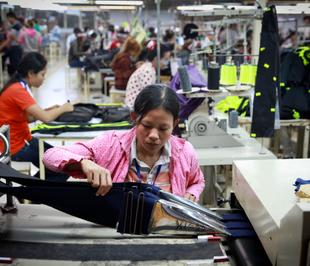Webinars and workshops 2025
During 2025, we will hold seven 1.5-hour webinars and online workshops for public authorities to help them address modern slavery and human rights risks in their global supply chains.
There will be five sessions on high-risk, high-spend sectors, and two skills-building workshops on evidence, evaluating the quality of information from suppliers to meet their contract criteria and how they can improve it. Attendees will receive practical guidance notes covering the issues, questions to ask suppliers and key contacts with expertise in particular sectors and countries.
All webinars will take place online from 11:00-12:30 CET. Download the timeline in PDF.
Participating public authorities should send the list of attendees with their names and e-mail addresses to Cindy Berman and Haëndila Varela at least one week before each webinar.
______________________________
Next webinar
The furniture sector: improving conditions for workers
The global furniture market revenue is projected to reach approximately US$730 billion in 2025, with the United States and China being the largest markets. In the education sector alone - covering schools, colleges and universities - the global spend on furniture was estimated at approximately $10.7 billion USD in 2023. In the UK, expenditure on furniture in schools is estimated to be up to £973 million annually.
In this webinar on December 10, labour rights organisations and suppliers to the public sector will share their expertise on labour and human rights issues in the industry, and strategies to address this. They will highlight examples of good practices to tackle and prevent worker rights violations and provide practical advice you can use in your procurement processes.
_____________________________
Previous webinars
Credible evidence, stronger supply chains (second workshop)
The second of two practical workshops focusing on evidence, this session looked at asking the right questions to get better information from suppliers. Electronics Watch experts helped participants understand how to assess different types of information, primary and secondary data, consider ways to score tenders based on the quality of evidence and where it comes from, and more.
Threadbare ethics? Labour abuses in the textiles sector
Public bodies buy vast quantities of uniforms, bedding, and towels for government agencies, military, hospitals, and other public services around the world. The global textile industry is a massive market, valued at approximately $1 trillion, with projections to reach $1.5 trillion by 2027. It employs approximately 60 million workers (excluding those working in the fashion industry).
Labour exploitation in the textile industry is rife. Most production takes place in Asia, but is also significant in Africa, Asia, Central and Latin America as well as Europe. It is a fiercely competitive market - a race to the bottom on prices, with high demand for increased choice, quality and speed of production resulting in squeezed labour costs. The industry is characterised by low wages, health and safety hazards and poor working conditions - especially in the case of mass-produced standard textiles (e.g. PPE, bedsheets, towels, aprons).
This webinar on 24 September heard from suppliers and public buyers that are actively engaged in ethical sourcing and monitoring of textile supply chains, as well as civil society organisations who shared their research and strategies to improve working conditions in textile supply chains, especially in the global south.
Navigating high-risk waters: advancing decent work in the seafood industry
Seafood is the most traded food commodity globally, providing nutrition to billions and employing around 60 million people.
However, whether it is fresh or frozen, the seafood we find in university canteens, care homes or on hospital meal trays is likely fished and processed by workers who are subject to gross exploitation and rights violations. According to the ILO, 128,000 fisher workers are in situations of forced labour. The seafood sector is one of the most dangerous occupations, with an estimated 24,000 casualties a year.
In this webinar on June 25, seafood worker representatives, civil society organisations and academics shared their expertise on labour and human rights issues in the industry. Highlighting examples of good practices to tackle worker rights violations, they provided practical advice for procurement processes. Speakers covered questions to ask suppliers, guidance on employment standards that public buyers should expect to see in the sector, and discussed different sources of expertise and advice.
Credible evidence, stronger supply chains
This first workshop on credible evidence offered practical advice and tools to demand more reliable information and better due diligence from your suppliers.
The first of two workshops, this webinar guided participants through the strengths and weaknesses of different kinds of information and evidence that they may require from suppliers to demonstrate how they comply with socially responsible public procurement requirements.
It included practical advice on how to review and evaluate the credibility of:
- Self-assessment questionnaires
- ESG risk scores
- Certifications / labels
- Modern Slavery / Human Rights Statements
- Other sources of information (e.g. media / NGO reports)
Transport and logistics
Critical to the way our global economy operates, the transport and logistics sector employs 18.5 million people worldwide. Workers suffer unsafe working conditions, discrimination and harassment, poor pay and extremely long hours doing physically arduous work on precarious contracts. Unscrupulous logistics and transport suppliers take advantage of the hidden nature of these services by exploiting workers to reduce their costs.
In this webinar on March 26, transport and logistics workers, inspectors and employers shared their expertise on labour and human rights issues. They highlighted examples of good practices to tackle worker rights violations, and provide practical advice you can use in your procurement processes.
The construction industry
The construction industry contributes to economic growth and creates employment for around 220 million workers globally. But it is also known for its negative impacts on the environment and poor human rights record. Construction jobs are among the most dangerous and exploitative in the world, carrying high risks and incidence of modern slavery. Governments and public sector bodies are by far the largest customers of construction projects and have enormous leverage that could drive improvement for workers and reduce harm to the environment and communities.
This webinar on January 29 highlighted examples of good practices and initiatives to tackle and prevent worker rights violations on construction sites, and provided practical advice for public buyers to use in their procurement processes. The speakers discussed questions to ask suppliers and relevant tools and standards, as well as sources of expertise for further information and advice.
Banana workers at risk
The first webinar, a free taster session held on 1 October 2024, focused on the banana industry. Watch it below or read the briefing note for an overview.









